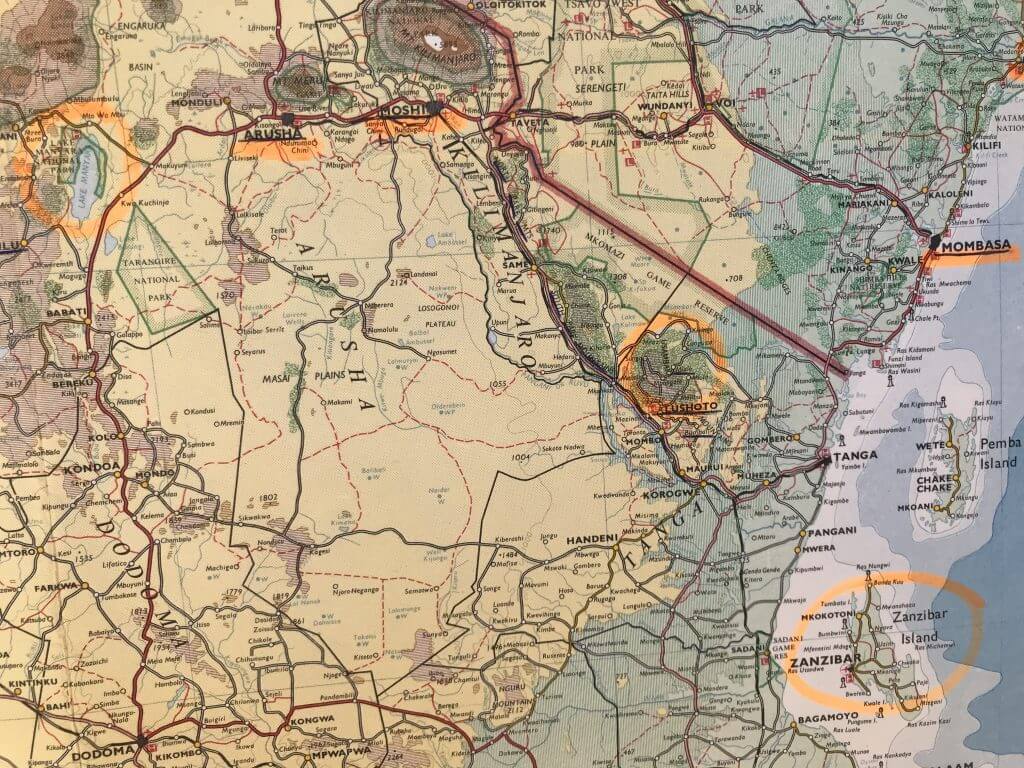#5: East Africa, 1974
While I was working on the ELCT film, I’d typically be away from home for 3-7 days, then back for days or even weeks, depending on the availability of hosts for my scouting visits, as well as an ELCT driver to take me to potential film sites if I couldn’t get there by rural bus. So life went on — Little Theatre performances, entertaining guests, trips to sights near and far, plus coping with unexpected challenges.
Here are highlights of the first full year of our East Africa sojourn — excerpts from letters I wrote Mom and Dad on onionskin with my manual typewriter, starting early in 1974 before the film project began in April. I’ve finally been able to access our storage, so you’ll find contemporary photos too.
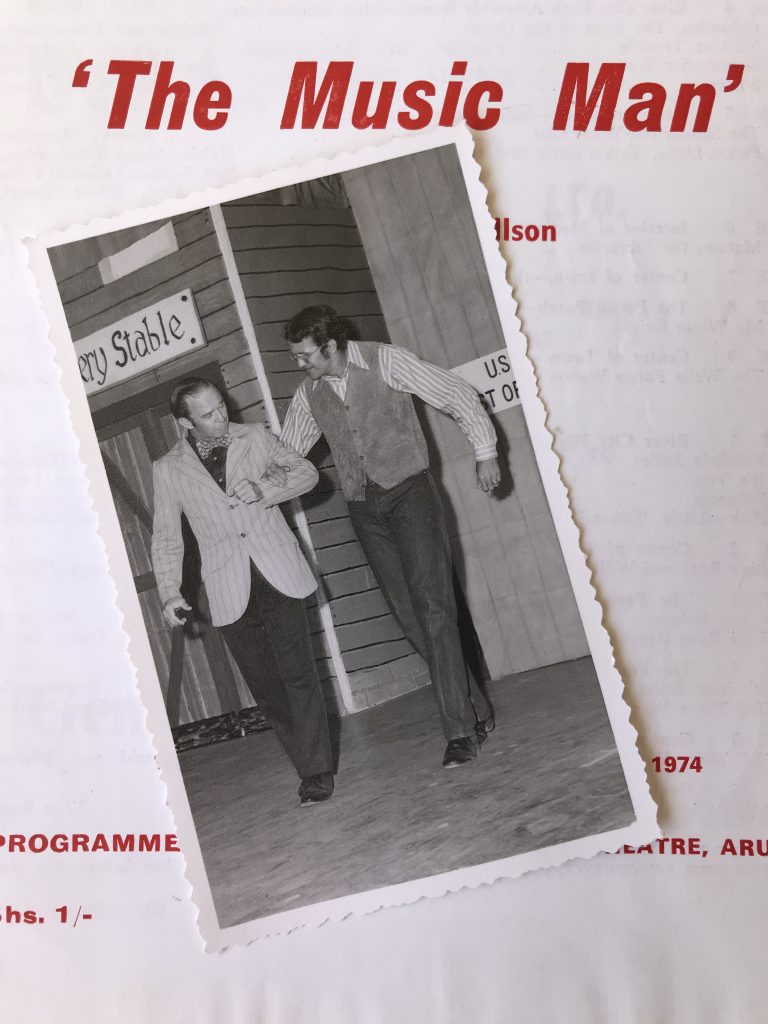 February 6
February 6
We’ve started lines rehearsals, chorus rehearsals and dance rehearsals for “The Music Man.” Russ is singing, dancing and acting for the first time. I never had to choreograph a whole musical, so we’re both growing.
March 8
Russ took me to nearby Meru Game Sanctuary for my 30th birthday, a surprise party with friends in a lovely atmosphere. Run by German expatriates, it’s really the only special restaurant we have here. We had soup, eggs Florentine, chicken with mushrooms, assorted vegetables and a chocolate torte, not to mention wine and liqueurs.
Morale among “Music Man” players has suffered a bit. Most look on the theater as recreation and weren’t prepared to give as much time to rehearsal as a musical requires. But I think everyone has learned from it, and the last rehearsal left everyone with high spirits and a good performance.
Arusha is a much smaller town than its official population figures (45,000) would indicate. We’re both chafing some at the lack of facilities and entertainment we’ve come to appreciate: museums, galleries, fine restaurants, good movies, etc. We’re learning to adjust to our new life, and we cheerily aren’t ready to come home, but we’re in that inevitable settling-in period when the newness has rubbed off, with the additional problem of no job for me yet.
March 22
A lovely holiday in Mombasa with friend Diane from Sacramento. We took along houseboy Shabani and black Lab Ralph. Shabani and Ralph’s presence helped provide security, always a problem at any beach.
Diani, where we stayed, has been called one of the most beautiful beaches in the world. Our location was super. We just walked down to the water on white talcum-powder sand. The cottage had 2 bedrooms, a front verandah for sitting, a back verandah for eating, a huge pantry, separate cookhouse with staff quarters, another building for toilet and shower room. Woodwork and furniture were heavy dark Arab style.
Ralph loved swimming in the surf. We were so glad we took him. He was very well behaved and slept thru the long drive both ways.
We felt like we didn’t have enough time to explore the ancient Arab city. We look forward to returning. Besides, all that fresh lime juice is enough to keep you coming again and again.
Back in Arusha, we had extra performances of “The Music Man,” because it was sold out. Tomorrow is the last night. Then there’s a big cast party.
April 18
We returned to Mombasa for Easter. We drove to Voi on Thursday and stayed overnight at a safari lodge. We went on to Diani Beach on Friday and spent the day swimming and walking over the tide pools which have all those things you always thought maybe National Geographic created with trick photography. Saturday we spent in town, shopping in the morning. We each bought a pair of rubber zoris to walk on the coral, Russ got tennis shoes, and I got dressy beige sandals. We also bought a caftan apiece to wear around the house in lieu of robes. Very chic and African to boot. We had a great Chinese lunch and then sat around one of the old colonial hotels for two hours, drinking orange soda and reading novels until it cooled off enough to do some sightseeing. Around 4:00 we visited Fort Jesus, built at the end of the 16th century by the Portuguese. Successively occupied by Arabs and the British, it’s full of passageways, barracks, houses, a church, a mosque, cisterns, ammunitions stores, ramparts and fortifications in a variety of architectural styles and periods. They have a nice, small museum with artifacts found all over the region: Siamese storage jars, ancient Chinese pottery, carved chests and doors, etc. After a Coke break, we walked through the old Arab quarter which has preserved its flavor from the time the fort was built: narrow streets for only foot traffic, richly carved doors and a harbor full of dhows ready to return across the Arabian Sea now the monsoons have come.
Sunday, we lolled around the cottage and the beach, then took a glass-bottomed boat over the deeper part of the reef. Russ put on mask and fins to snorkel, but it was too rough for me. Later in the day, the tide was really low, and we walked on the reef for 2 hours. The next morning, we were awakened by dogs barking and saw an elderly African holding a rock in each hand, protecting his daughter and grandchild behind him. We went outside, thinking it was a snake, and found the dogs had chased a kudu buck out of the bush, exhausting it to the point that it could barely stand. It was too late to save it, so Russ ran for the lady from whom we rented our cottage, hoping she had a gun to put it out of its misery. They returned, and she shouted at the Africans to get the dogs off the buck. Another couple came out of their cottage at this point, and the man held the dogs at bay while Russ and the little old lady rushed to the man with the glass-bottomed boat. He returned with a pellet rifle, accompanied by a Moslem with a knife. The boat-owner shot the animal in the brain, and the Moslem ran in to slit its throat before it died. Moslems can only eat meat killed this way. The Africans dragged the buck off and butchered it. We were offered a piece of the [highly prized] liver but declined.
We drove back through some of the most beautiful country here: lush tropical coast, then a band of coastal desert, followed by mountains and then plains full of elephant and giraffe until we came to Kilimanjaro and home. Because of the rains, everything including the desert, was green. The whole trip was made in a subtle and changing fragrance of blooming vegetation.
April 23
Russ has decided to direct Noel Coward’s “Nude with Violin.” We both read it yesterday. It’s very funny and a good choice for an amateur group.
June 3
We spent the weekend at Lake Manyara. Particularly beautiful this time of year with an unusual variety of game: elephant, baboon, blue monkey, vervet monkey, buffalo, impala, Monitor lizard, flamingo, zebra, rhino, giraffe, as well as many kinds of birds and fantastic vegetation. We also saw three lions up in a tree, a sight for which Manyara is famous, but which people rarely see. One friend told us she had been to Manyara three times but still hadn’t seen any lions in trees. Ours were in a big tree, 30 feet up, hanging over the road, all females.
Manyara Park is on the westernmost side of the Rift Valley, directly below the almost vertical walls. We stayed at the Lake Manyara Hotel on the edge of the escarpment overlooking the lake, a spectacular location. We had off-season rates of $25 for two, full-board. All the hotel rooms face over the escarpment and the lake. You can see for miles, including a number of dormant and active volcanos.
June 17
Russ has been sick with some stomach trouble. We have regular lab tests to catch Africa bugs before they can do harm, so you needn’t fret we might fill up with parasites. You may have read that there’s cholera in Kenya. We had our cholera shots in April, so we’re fine on that score too.
Moshi is about 45 miles/1.5 hours from Arusha. When I drive there or to Nairobi, I often give rides to people who are also going. But sometimes I go alone. People are more helpful here than they are at home, and since I speak Swahili increasingly better, there’s little worry. We had a minor mishap when we were in Serengeti (the car slipped off the road into a shallow ditch). People of the nearby village came to shake our hands and say, “Pole sana” (very sorry) or “Bahat mbaya” (bad luck). Then 20 pairs of hands heaved the car back onto the road, and everyone smiled and waved goodbye. I’d rather travel alone here than in many parts of the States.
August 9
I’m writing this from Kilimanjaro Christian Medical Center in Moshi, where I’m recuperating from a lumbar hernia operation. Turns out lumbar hernias are very rare everywhere, but there’s a genetic predisposition in East Africa, so they have lots of experience here. We didn’t want to tell you until it was all over.
Early in July, Russ noticed a lump in my back, and I came here to consult with Peter Bewes (pronounced “booze” — a bit disconcerting, but he’s a well-respected British surgeon). After a confirming second opinion in Nairobi, we scheduled the operation at KCMC in Moshi. The date was chosen to fall immediately after my film safari to Dar and beyond and early in August so as not to interfere with other events already on the calendar.
I entered the hospital Monday afternoon. Dr. B and another British surgeon performed the op on Tuesday morning. They found not a classic hernia — a bit of gut sticking through the muscle wall — but that the muscle had thinned and ballooned outward. They sewed a patch of man-made fabric (a “teflon patch,” they joked) over the weakness to which my body will attach tissue in the coming months, strengthening the area.
My American nurse-friend, Susanna, observed the operation and said the staff was first-rate. She reported that the surgeons had asked if I’d had polio, which might explain the muscle weakness, and I told her I was indeed a polio survivor. As you might imagine, Susanna and the surgeons found this fascinating. I was in intensive care for 24 hours, then moved to a private room with a view of Kilimanjaro.
Russ has rented a room at Moshi’s Livingstone Hotel and has been able to visit every night and morning. Susanna was with me all day Tuesday in the recovery room and is returning today. I go home tomorrow.
August 19
Russ has cast “Nude with Violin.” Last Wednesday, we had a reading with the full cast gathered around my bed. The first rehearsal in the theater is tonight — Act 1. I’m in Act 2, which doesn’t start rehearsing until next week, so I have another 7 days to recuperate. I play the part of the Russian Princess. In the meantime, I’ve designed the set, doing both a colored pencil drawing and a floor plan. The carpenters from the Italian firm which is building the new East African Community HQ will construct the set. Hope to have the walls up next week.
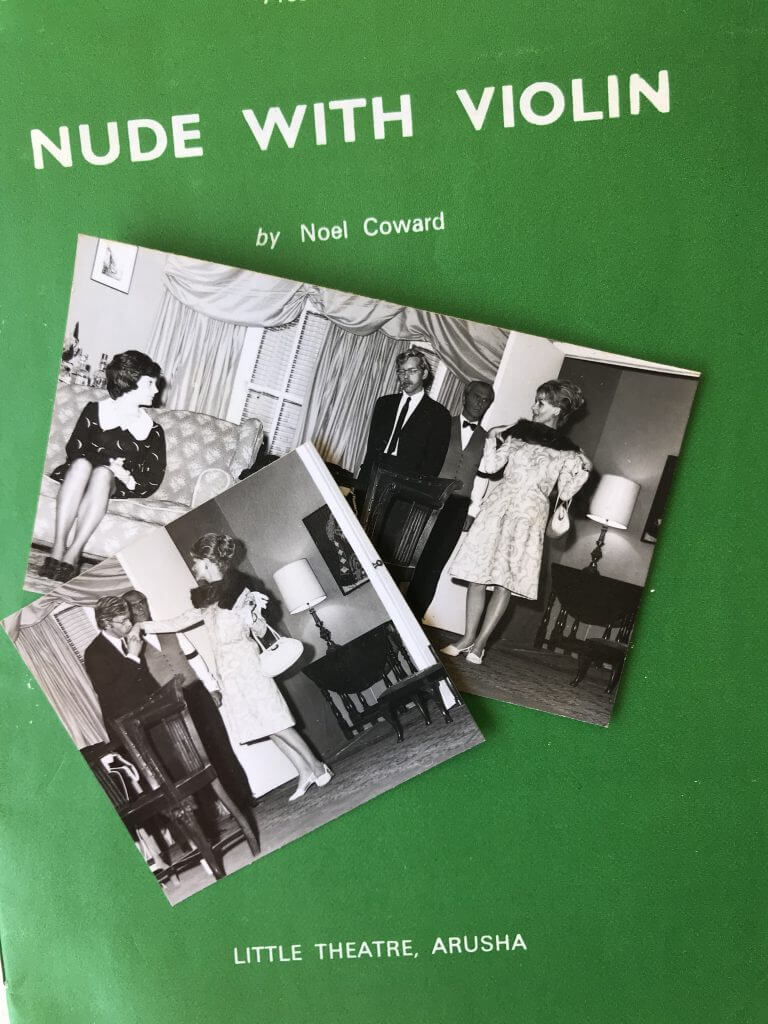 September 15
September 15
We selected fabric for my Russian Princess costume. I’m cutting it out and hope to have it finished by this Friday, when we have the technical rehearsal — checking lights, costumes, makeup, etc. It’s just a simple suit of beige paisley crepe. I can imagine you’re saying that I won’t look good in beige, but I’m supposed to look fifty, not good. One of the problems in amateur theater is getting actors/actresses to accept hairdos, costumes, etc. that don’t necessarily look good but which are appropriate for the character. I’m delighted at the chance to be someone different and can hardly wait to see how the beautician does my hair.
October 5
We’re dead tired today, having had our final performance last night and the cast party which lasted until 3 a.m. Sold-out performances with friends coming from as far as Nairobi to attend.
After many false starts, the EAC finally assigned us a house in Arusha. It’s an old German colonial bungalow with tiled roof covered in bougainvillea and morning glories. Following the usual painting and maintenance, we hope to move in early Nov.
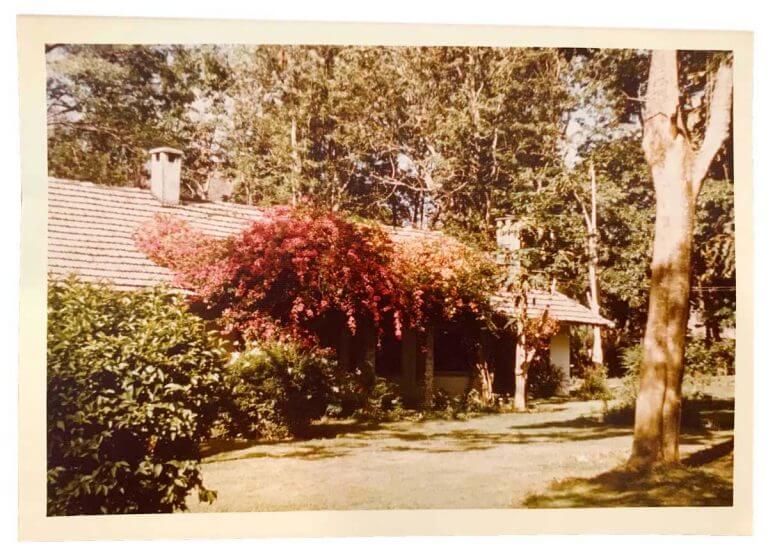
December 11
Last Friday, Ralph was killed by a large truck speeding through our residential neighborhood. We’d let him out to do his morning duty and when he didn’t return for his breakfast, we went to look for him. Russ found him crumpled at the side of the road, his body still warm. He died instantly of a massive chest wound. Russ had to go on to work, so Shabani, Saidi and I took Ralph up on Mt. Meru to a friend’s house, where his African friends dug his grave, and we buried him with flowers from our garden. We’re all feeling pretty bad. Ralph was still full of life, having spent so little of it — just over a year. He died as he lived, running with reckless abandon just because it felt good. We know we’ll probably have dogs again and that we’ll love them as much, but a very special light has gone out of our lives right now, and we do miss him a lot.
We’d already organized a trip to Zanzibar for the long weekend of Tanzanian Independence Day, so we decided to continue on. A good thing for lots of reasons — Zanzibar is one of the most interesting places in Africa, and the trip got us away from the house at an unhappy time.
We flew in on Saturday afternoon, got cleaned up (it sure is hot there) and walked around town. The island of Zanzibar is a former Arab sultanate, and the town retains the narrow, winding streets of those days. We saw the former British consulate’s building where Burton, Speke, Livingstone and other explorers began their expeditions into the interior. Nearby is the “House of Wonders.” One of the Sultan’s palaces, it has a central court that stretches up three very tall stories with balconies all around. Even though it’s deserted now, you can understand how it got its name.
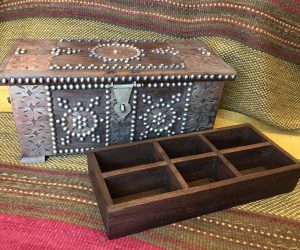 We took in some shops and saw lovely brass and copper trays — some quite old — silver jewelry and boxes, plus large Zanzibari chests, for which the island is famous. They’re made of aromatic wood and bound in elaborate brass trim. Most of the old ones are long-gone from the island, so we ended up buying a new one from the craftsman himself, a gentle old Arab who is having difficulty getting the materials he needs. We have the feeling that this art will vanish in a few more years. They may continue to make imitations — you see cheap ones on the mainland all the time — but the real expertise will be gone. We bought what we could afford, a bazaar merchant’s cash box.
We took in some shops and saw lovely brass and copper trays — some quite old — silver jewelry and boxes, plus large Zanzibari chests, for which the island is famous. They’re made of aromatic wood and bound in elaborate brass trim. Most of the old ones are long-gone from the island, so we ended up buying a new one from the craftsman himself, a gentle old Arab who is having difficulty getting the materials he needs. We have the feeling that this art will vanish in a few more years. They may continue to make imitations — you see cheap ones on the mainland all the time — but the real expertise will be gone. We bought what we could afford, a bazaar merchant’s cash box.
The next day, we took a tour around the island with a govt. guide. Zanzibar had a rather violent revolution ten years ago, and one is still not allowed to wander at will outside the town. The official guides are courteous, articulate, well-informed and good drivers. We got one of the best tours we’ve had anywhere. We saw the market, the former harem, farms of cloves, cinnamon, coffee and lemon grass, all of which were given as samples to take home. Cloves are the main export, and the whole island has this delicious smell.
Most moving were the sites from the old slave trade — the cave where the slaves were held after being brought over from the mainland and the slave market itself. The British built an impressive cathedral on the market site after they banned slavery, but you can still feel the presence of all those lost souls torn from their families and facing a future that brings shudders to contemplate.
Late that afternoon we walked around again, taking pictures and visiting the small but well-done aquarium. We also had tea at the first-class hotel, where we returned for dinner. We stayed at one of the old hotels — thick walls, high ceilings and carved doors with brass studs, also a trademark of the island.
December 14
We’re finally getting rid of our rental car. I believe I told you about the Swedish engineer who bought a car to share with his colleague. Now the colleague isn’t coming, and Fyr is only here a month at a time, every 2-3 months, and living in a hotel. We’ll pay him a fee-per-mile for the use of the car until R’s contract ends in 11 months. In this way, Fyr recoups his loss, and we get a car for 1/2 the price without all the hassle of ownership under the new laws.
We may get another dog. They’re almost a necessity for security, and we miss Ralph a lot. One of the vets had some golden Labs on offer, and we’re going to see if any of the puppies are still available.
All this promises a good end to the year, doesn’t it?
* * *
As we look back upon decades of living overseas, we realize how lucky we were to have spent significant time in places that were later much changed by mass tourism. We traveled here and there, making our own arrangements, sleeping in a tent or staying in an old, traditional hotel (often one with ceiling fans in lieu of air conditioning). Those days are gone, and we were privileged to have experienced them.
Another aspect of the changing lives of folks who live and work overseas is electronic communication. For years, we did without television, emails, text messages, even faxes. Certainly, there was no Zoom or Skype to stay in visual contact with friends and family. We made our own entertainment, whether amateur theater, an evening of conversation, or charades.
News came late. I remember one day, we managed to get minimal shortwave radio reception of BBC World Service through the static caused by Arusha’s nearby mountains. “President Ford said today…” the newscaster reported. “President Ford???” we exclaimed in unison, “Whatever happened to President Nixon?” A week later, an outdated Time magazine arrived from Nairobi, and we learned that Nixon had resigned. These days, we’re bombarded by instant news 24/7. A week’s delay of world news gave us perspective and serenity.
* * *
If you enjoyed reading this post, I hope you’ll SUBSCRIBE by clicking on the button below. Every month, when I post a new excerpt from my life overseas, you’ll get an email with a link so you can read the next installment. Subscription is free, and I won’t share your contact information with anyone else. Your subscribing lets me know you’re reading what I write, and that means a lot.

